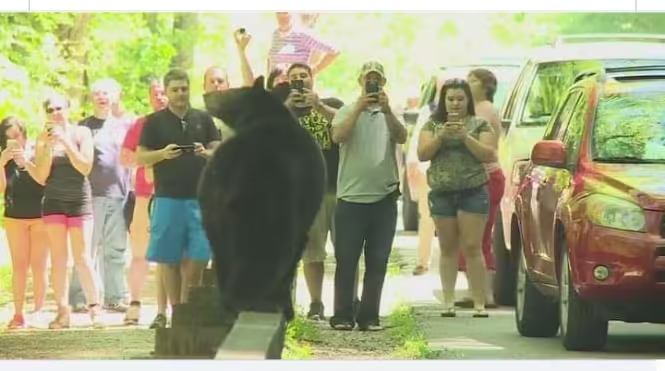SEVIER: Appalachian Bear Rescue Takes in 3 Orphaned Cubs and Calls for More Action to Protect Bears in East Tennessee
The sun was just beginning to crest over the smoky peaks of the Appalachian Mountains when a call came into the Appalachian Bear Rescue (ABR) headquarters. It was a call that the team had grown sadly accustomed to: three orphaned bear cubs, found wandering alone and vulnerable, were in desperate need of help.
The ABR, located in Townsend, Tennessee, is a non-profit organization dedicated to the rescue and rehabilitation of orphaned and injured black bear cubs. Over the years, they have become a crucial lifeline for these creatures, offering them a second chance at life in the wild. The latest arrivals—a trio of cubs, barely old enough to fend for themselves—were found near a hiking trail in the Great Smoky Mountains National Park. Their mother was nowhere to be found, presumed dead, likely the victim of a vehicle collision or illegal poaching.
When the cubs arrived at ABR, they were in a pitiful state. Malnourished and dehydrated, they huddled together in the corner of their transport cage, eyes wide with fear. The smallest of the three, a female cub they named Autumn, had a noticeable limp, likely from an injury sustained during their ordeal. The other two, a pair of males named Smoky and Blue, were equally fragile, their ribs visible beneath their thin fur.
Dr. Emily Turner, the lead veterinarian at ABR, quickly got to work. “It’s always heartbreaking to see them like this,” she said, gently examining Autumn’s injured leg. “But we’re here to help, and with a little care and a lot of love, they’ll have a fighting chance.”
The cubs were given a thorough medical examination, their injuries treated, and their stomachs filled with a nutritious formula designed to boost their strength. Over the next few days, they began to settle into their new surroundings. The ABR team worked tirelessly, feeding them every few hours, monitoring their progress, and ensuring they had a safe, warm place to sleep.
While the rescue of these three cubs was a success story, it underscored a much larger issue: the increasing threat to black bears in East Tennessee. The region, known for its rich biodiversity and stunning landscapes, is also a hotspot for human-bear conflicts. As development encroaches on bear habitats, the animals are forced into closer contact with people, often with tragic results.
“Every year, we see more and more orphaned cubs coming through our doors,” said ABR Executive Director Lisa Stewart. “It’s a clear sign that something needs to change. We can’t keep up with the number of bears needing help, and we need the community to step up and take action.”
Stewart pointed to several key areas where improvements could make a significant difference. First and foremost, she called for stricter enforcement of laws against poaching and illegal hunting. “These bears are a vital part of our ecosystem,” she explained. “When we lose them, we lose a piece of our natural heritage.”
Secondly, she highlighted the importance of safe driving practices in bear-populated areas. “Many of the cubs we rescue are orphans because their mothers were hit by cars,” Stewart said. “We need better signage, lower speed limits in key areas, and public awareness campaigns to remind people to be vigilant.”
Finally, Stewart urged local governments and developers to consider wildlife corridors and green spaces in their planning. “If we can create safe passageways for bears to move through their habitats without crossing busy roads or entering residential areas, we can reduce these conflicts significantly.”
The call for action has resonated with many in the local community. Volunteers from across the region have come forward, offering their time and resources to help ABR in its mission. Local businesses have started fundraising campaigns, and schools have organized educational programs to teach children about the importance of coexisting with wildlife.
One such initiative is the “Bear Aware” program, launched by a group of concerned citizens in Sevier County. The program aims to educate residents and tourists about the importance of securing trash, not feeding wildlife, and taking precautions when hiking in bear country. “It’s all about creating a culture of respect and understanding,” said program coordinator Jessica Lawson. “When people understand the impact their actions can have on bears, they’re more likely to take steps to protect them.”
Back at ABR, Autumn, Smoky, and Blue are slowly but surely regaining their strength. With each passing day, they grow more confident, exploring their enclosure, playing with the enrichment toys provided, and learning the skills they’ll need to survive in the wild.
Dr. Turner is optimistic about their future. “These cubs are fighters,” she said, watching them wrestle playfully in the grass. “They’ve been through so much, but they’re resilient. With the right care and support, they’ll be ready to return to the wild where they belong.”
For ABR, the journey is far from over. Every cub they save is a testament to their dedication, but it’s also a reminder of the ongoing challenges faced by black bears in East Tennessee. As they prepare for the next wave of rescues, they remain steadfast in their mission: to give every orphaned and injured bear a second chance, and to fight for a future where these majestic creatures can roam free and wild, safe from harm.
The story of Autumn, Smoky, and Blue is one of hope and resilience. It’s a story that underscores the urgent need for action and serves as a rallying cry for all who care about the future of East Tennessee’s wildlife. With continued community support and a commitment to change, there’s hope that one day, the sight of an orphaned bear cub will be a rare and unusual occurrence, rather than a common call for help.
